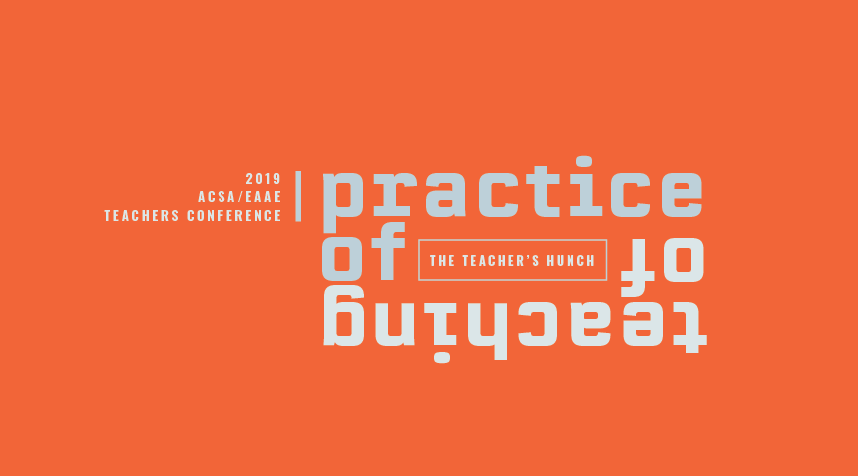the Practice of Teaching / the Teaching of Practice: the Teacher’s Hunch
2019 ACSA/EAAE Teachers Conference in Antwerp, Belgium
27.06.2019 – 29.06.2019
OVERVIEW + CONTEXT
- Weimar 1919: Walter Gropius establishes the Bauhaus as a school for a new world, unifying art, science, and technology under a new pedagogy whose core is design.
- Oxford 1958: RIBA’s groundbreaking conference questions the relevance of architectural education and asserts architectural research as essential to advancing practice and focusing education.
- USA 1996: the Boyer Report connects design pedagogy and research to the central missions of both university education and the architecture profession: societal good.
- Europe 1999, the Bologna declaration established architectural education as an academic discipline, i.e. based upon research, consequently bringing the traditional balance between theory and practice under pressure.
Throughout these transformative events in architectural pedagogy, the relevance of design practice for architectural education remained present, due to the undisputed premise that the spaces of pedagogy and inquiry alike are one continuous and collective space of learning. If research and teaching are seen as two fundamentally intertwined sides of one diptych, practice is the hinge that holds those parts together which unhinged and on their own become meaningless.
Although the university is still seen as a site of research and knowledge production, it has also delivered huge cohorts of knowledge producers outside the university. In architecture, key figures expand the building and production of disciplinary knowledge through research, investigating urgent challenges of society. Architectural firms in the private sector can conduct basic research either in their own right or through some kind of collaboration with academic, editorial, or cultural institutions, thus becoming powerful agents of societal critique at the same time as they produce design solutions to real world problems. How is this knowledge production into academic architectural education recuperated? How can architectural education be secured and reoriented to respond to the lines of fracture of society?
Practice-based design research has come of age, and led to significant research and publications. Today, we are beyond questioning basic research ethics such as ‘originality, significance, and rigor’ — as all formats comply. We see proof of astute architectural research in both written and non-written output. Eventually, more stringent questions emerge when curricula focus on a nexus of architectural research and teaching architectural design. Which affinities do researchers and practice teachers share?
During recent decades, higher education reform has strongly promoted the concept of the student as an independent learner, resulting however in a subsequent decline of the debate about the profile, role, agency, and interests of the teacher as an educator and initiator of/contributor to research. What is it that drives the teacher?
Rather than having a clear research topic, the practice teacher operates in a field of both urge and fascination; (s)he follows a hunch, steering the design studio to a proper outcome. The difference between a hunch and a fully developed inquiry lies in an interest that either is not (yet) formally recognized to be lucrative—the hunch—or is approved by private, public or academic peers—the research topic. The hunch relates to intentionality and when consistently pursued across a series of projects that intentionality becomes clear and ready to be subjected to peer reviews. The hunch or intuition also acknowledges that a ‘premise’ is incomplete and can be understood as reaching for something not yet perfectly defined. Therefore, the hunch is absolutely critical in advancing both research and the education of practice. The quality of the teacher’s hunch thus accounts for both learning incentives and advancing the research of the faculty, thereby shifting the focus from ‘what can be done’ to ‘what ought to be done’.
HOW TO SUBMIT
The deadline for submitting to the Teachers Conference is extended till FEBRUARY 15, 2019. Authors will submit abstracts and poster proposals through ACSA’s online interface. ACSA members will log in with their ACSA username and password. EAAE members and other authors will create an account on the ACSA website to log in.
PEER REVIEW PROCESS
All abstracts will undergo a double-blind peer-review process. The conference Scientific Committee will take into consideration the evaluations furnished by the peer reviewers and render final acceptance decisions.
CONFERENCE PRESENTATION & PUBLICATION
Accepted authors agree to make a 15–20 minute presentation of their paper at the Teachers Conference. Accepted authors must pay full conference registration to present at the conference and be eligible for inclusion in the proceedings and/or in the posters exhibition and online exhibit. Following the conference, authors of abstracts will submit finalized papers for review for inclusion in a proceedings published either with an academic publisher or through other digital means that will meet standards for indexing.
This conference focusses on the hunch that drives the practice teacher/ researcher in his/her teaching or research. With this call, the joint conference of the North American and European associations for architectural education solicits scholarly presentations for the conference and proceedings, as well as project-based position statement posters for a conference exhibit.
CREATE AN ACCOUNT
SUBMIT NOW
CONTACTS
For questions please contact:
Eric Wayne Ellis Allison Smith
Director of Operations and Programs Programs Manager
eellis@acsa-arch.org asmith@acsa-arch.org
202-785-2324 202-785-2324
THE CALL
IMPORTANT DATES:
2019-02-15 | Abstract Deadline (Extended)
2019-06-27 | Teachers Conference
2019-06-29 | Teachers Conference
2019-07-31 | Full Paper Deadline






